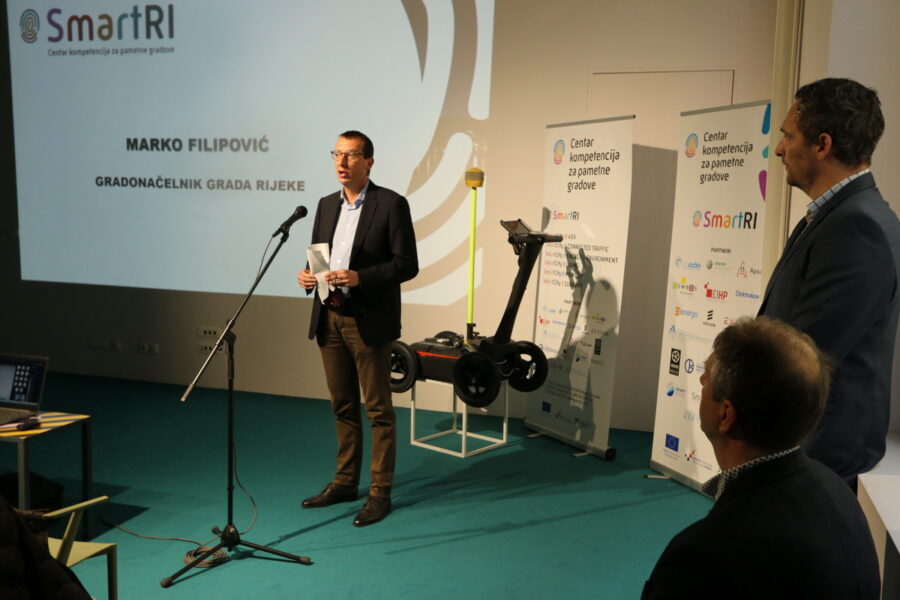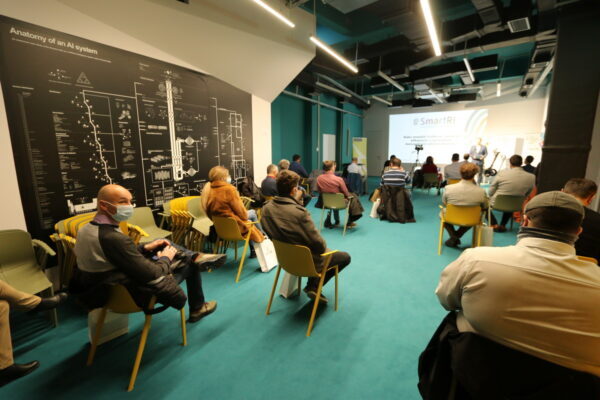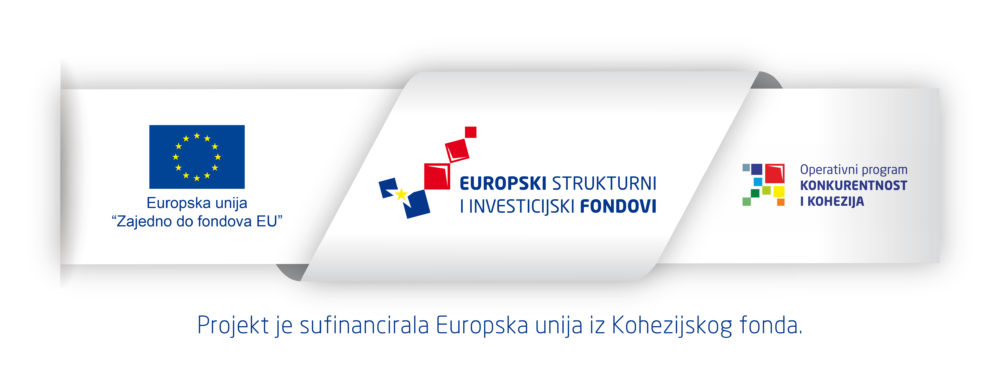
The cycle of six lectures, organised by the Smart RI society, with the aim of presenting ideas of applying information technology to improving the quality of citizens’ life and better functioning of cities and municipalities, has been closed.
The lectures were intended for representatives of local and regional self-government units of the Primorje-Gorski Kotar, Istria, Lika-Senj and Karlovac counties and they form part of the project activities of the Competence Centre for Smart Cities, whose promotor and applicant is Smart RI.
All six lectures, i.e. training courses, were aimed at raising awareness about the problem that many cities face, such as transport, energy, tourism, utility infrastructure, following this, solutions were presented in the form of products or services that are created through the project promoted by the Competence Centre for Smart Cities.

LECTURES INTENDED FOR REPRESENTATIVES OF CITIES AND MUNICIPALITIES
The overall value of the project promoted by the Competence Centre for Smart Cities is almost HRK 150 million, of which the amount of over 95 million is co-financed by the EU under the European Regional Development Fund – Operational Programme Competitiveness and Cohesion.
“This is the largest development project in Croatia in the field of information and communication solutions aimed at improving the quality of citizens’ life. The partners will develop as many as 36 innovative products and services in the field of smart city technology with significant market potentials, and more than 50 jobs have been created “, said the director of Smart RI Nenad Antolović.
The participants in the last lecture of the cycle were also welcomed by Rijeka mayor, Marko Filipović.
“This important project opens a large area for cooperation with companies in Rijeka and Croatia, and I hope that we will use the awarded EU funds for the benefit of all our citizens, but also a more efficient city administration,” said Mayor Filipović.
How to reduce costs and increase efficiency in the management of utility infrastructure?
The last lecture of the cycle was dedicated to the manner in which costs can be reduced while increasing efficiency in the management of utility infrastructure, i.e. the subproject “4D Intelligent Infrastructure”. The goal of the project is efficient recording and management of underground and aboveground utility infrastructure, in order to reduce costs, increase efficiency, attract investments and provide better services. Such a comprehensive method of data collection currently does not exist in the Republic of Croatia, not even globally, as there are currently only partial solutions to individual elements covered by the project. The project result will be an examined and tested database on utility infrastructure, as well as better and more efficient management of utility infrastructure. In addition to representatives of Ericsson Nikola Tesla, the University of Rijeka and the companies Alarm Automatike and 3t.Cable, the presentation was also attended by representatives of utility companies in Rijeka (ViK and Energo), that are included in this project activity.
As the quality of utility infrastructure directly affects the quality of service and product delivery to end customers, the use of georadar will provide a 3D view of underground infrastructure that will create a system of radar records that will be subsequently connected to an integrated system.
In addition to the mentioned systems for automatic processing and recognition of underground infrastructure based on radar records, and the system of innovative inventory and control of infrastructure, it has been envisaged to integrate various information on utility infrastructure with other socio-economic information and the impact that utility infrastructure has on the progress of business processes in a smart city.
Numerous representatives of the local governments of Rab, Poreč, Pazin, Krk, Punat, Jelenje, Ozalj, Kastav, Viškovo, Pula, Plitvice Lakes, Cres, Lovran, Senj, Crikvenica, Novalja, Fužine, Bakar, a number of utility companies and societies in Rijeka, as well as representatives of regional self-government units and regional development agencies watched livestreaming of the last lecture of the cycle Smart Cities and Municipalities.
Recordings of all lectures available online
Part of the lecture within the cycle was dedicated to the new EU financial perspective, i.e. potential manners of project financing that would implement solutions for smart cities, among others, the solutions developed within the project of the Competence Centre for Smart Cities. Namely, for Croatia the new financial perspective brings almost twice the amount than in previous years, given that in addition to the structural funds there is a new Fund for Recovery and Resilience which predicted to mitigate the effects of the COVID-19 pandemic on EU societies and economies through green and the digital transition.
Recordings of all lectures can be viewed on the YouTube channel of the company Smart RI, and more about the lectures with included presentations on the website of the company Smart RI:
- Smart tourism for a more resilient and sustainable destination
- Sustainable and smart mobility through a smart transport system
- Responsible attitude toward the environment and the budget
- Sustainable and smart mobility directed towards greener, carbon-free Europe
- (Open) Data – Oil in 21st Century and Cooperation Opportunities
- How to reduce costs and increase efficiency in the management of utility infrastructure?


